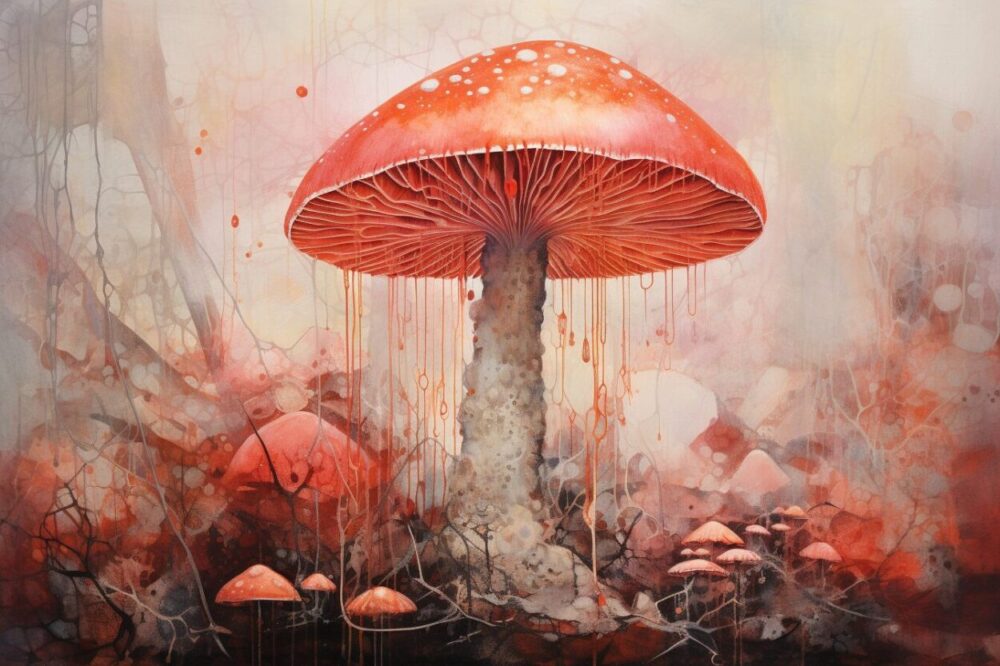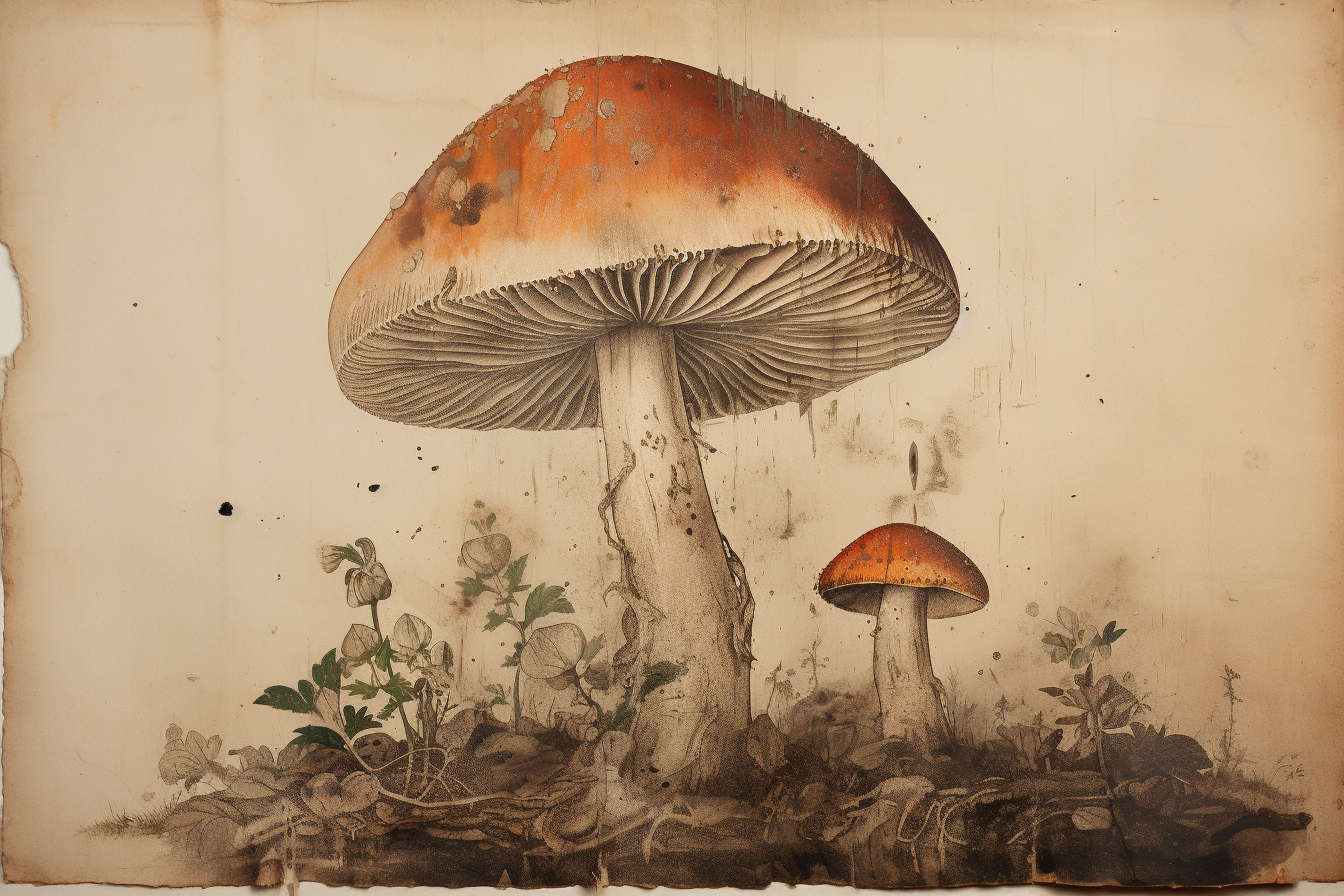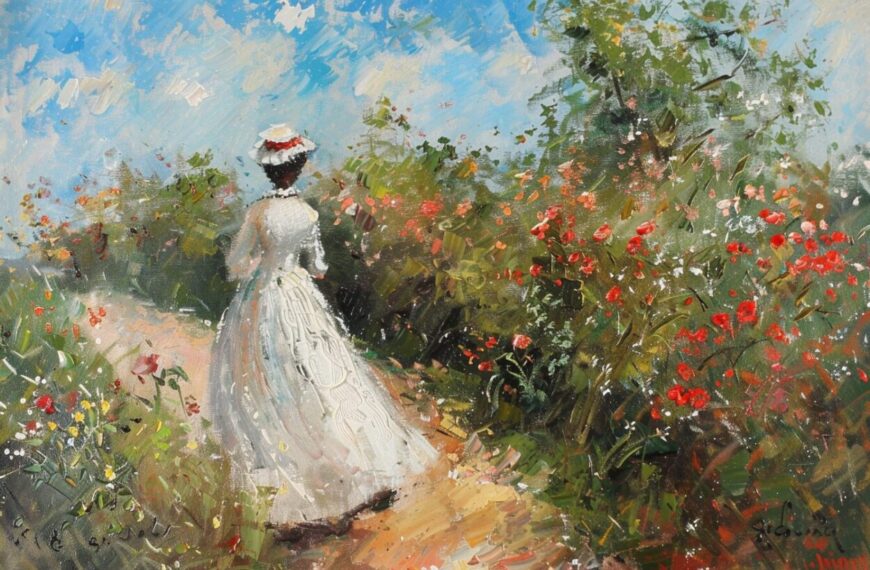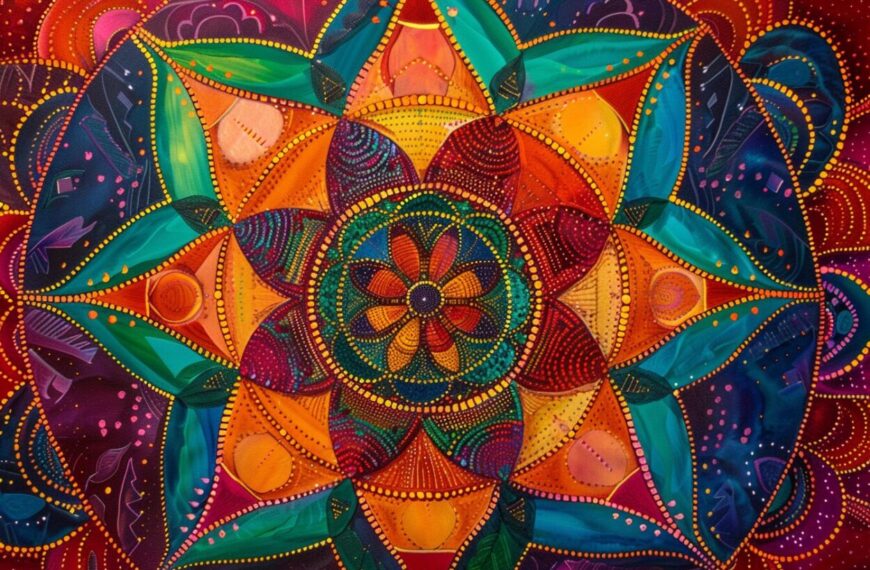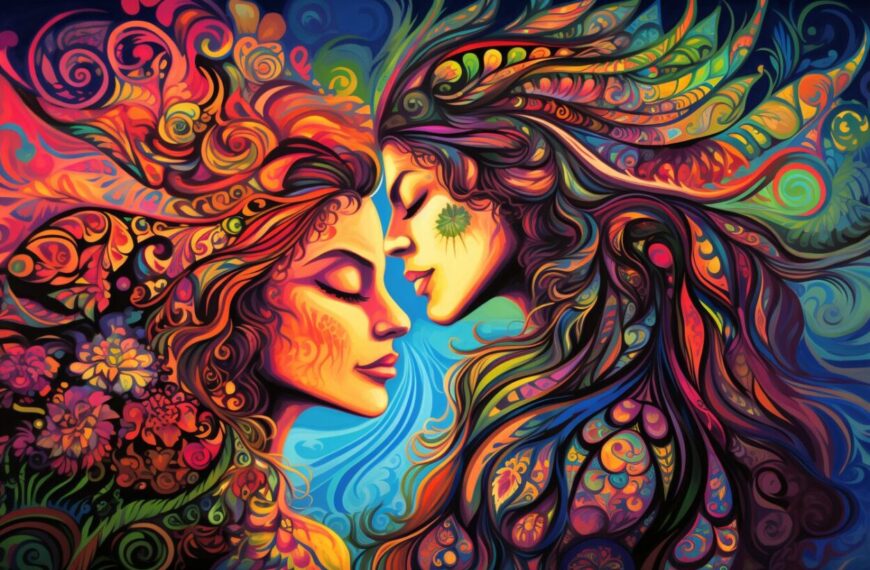Mushroom Symbolism & Meaning: Ultimate Guide
Mushrooms hold significant symbolism. Revered since ancient times, mushrooms have captivated the human imagination with their mysterious and enchanting nature. They possess many peculiar characteristics: their ability to rapidly emerge overnight in unexpected places. Some are bioluminescent, some can form vast network for nutrient-sharing, and in some cultures even believe that certain types of mushrooms can induce altered states of consciousness, leading to profound insights and spiritual awakenings.
In this article, we will explore the symbolism of mushrooms, uncovering their intriguing influence on societies and cultures throughout history. Additionally, we will delve into their spiritual significance, revealing the deeper meanings that mushrooms evoke.
- What Do Mushroom Symbolize?
- Mushroom Symbolism Across Cultures And Community
- Mushroom symbolism in Native American culture
- Mushroom symbolism in Greek
- Mushroom symbolism in Egyptian mythology
- Mushroom symbolism in African cultures
- Mushroom symbolism in Japanese and Chinese cultures
- Mushroom symbolism in Celtic Culture
- Mushroom symbolism in European Folklores
- Mushrooms Symbolism In Pop Culture
- Dreams Of Picking Mushrooms Meaning
- Dreams Of Eating Mushrooms Meaning
- Dreams Of Giant Mushroom Meaning
- Conclusion
- Related Posts
What Do Mushroom Symbolize?
1. Transformation and change

This is due to their sudden appearance after rain and their rapid growth and transformation. They don’t just randomly appear in great number after a rain. Unlike plants and animals which rely on cell division to increase in size, mushrooms enlarge their cells rapidly with water. This means matured mushroom has the same number of cells as when it first started growing. This allows mushrooms to grow quickly, expanding from a pin head to a large mushroom in a short time.
Read More: Rain Symbolism and Meaning
Mushroom symbolism can also be found in traditional medicinal use, such as the psychedelic properties of the Amanita Muscaria in certain shamanic ceremonies. Also known as the fly agaric, it has a rich cultural and folklore history, commonly associated with various mythologies, traditions, and rituals around the world.
Read More: Symbols of Growth Across Cultures
2. Death and Decay
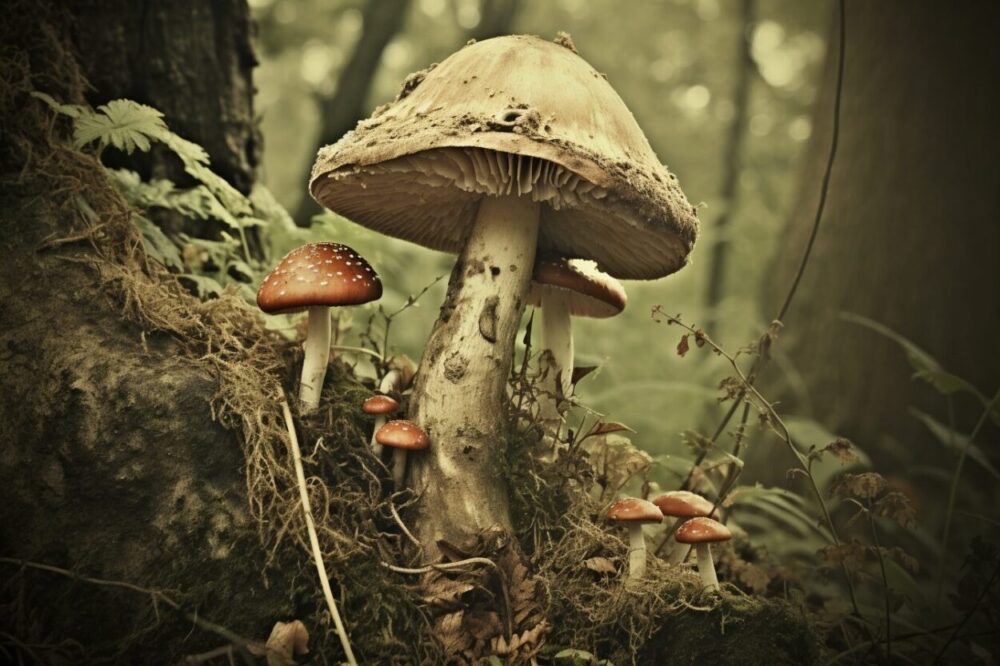
Mushrooms have been associated with death and decay, often found in places of death or decay like forests after a fire. Although the fire destroys the parts above the ground, there is still their underground network called mycelium that can often survive the heat. This mycelium can rapidly grow back in the burned area, taking advantage of the nutrients and decaying matter left by the fire. This allows mushrooms to thrive and help break down the fire-damaged plants, aiding in the ecological recovery process.
You would commonly find mushrooms on decaying materials and bodies. On there, mushrooms release substances that help break complex molecules into simpler forms, making the nutrients easier for other organisms to use.
Mushroom symbolism goes beyond decay and represents the deep connection between life and death. It teaches us that despite endings and decay, new beginnings and growth are certain. The mushroom’s resilience and beauty in the midst of decay show us the unexpected places where strength and grace can arise.
Mushrooms also symbolizes the interconnectedness of everything, and how death is a crucial part to life. Endings must happen for new beginnings to unfold.
Read More: 30 Symbols of Death and Their Meaning
3. Fertility and abundance
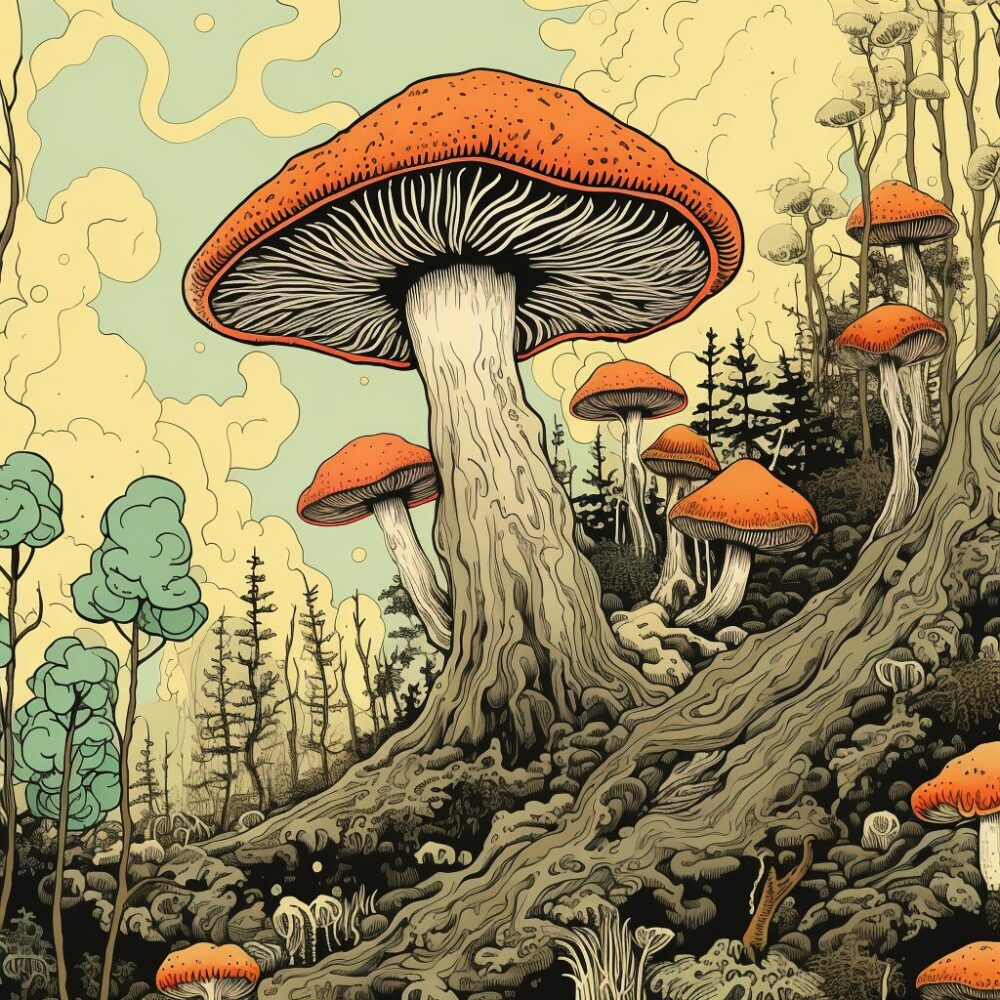
Mushroom nurtures other creatures. They decompose woody material, like tree roots, stumps, leaves, mulch, and twigs, aided by powerful enzymes. These fungi play a vital role in breaking down harder-to-digest substances, such as tree leaves and stems, for other creatures to use. They helps other plants endure stressful conditions like low fertility, drought, temperature extremes, and root diseases. Without mushroom, the green around us probably won’t be able to survive.
They connect with each other via a huge, vast web of nutrients that allow them to spread quickly to cover a wide area. That’s why mushrooms are always associated with fertility and abundance. Their capability to not only grow themselves in great number but also support the prosperity of other plants is fascinating.
4. Discovering illumination
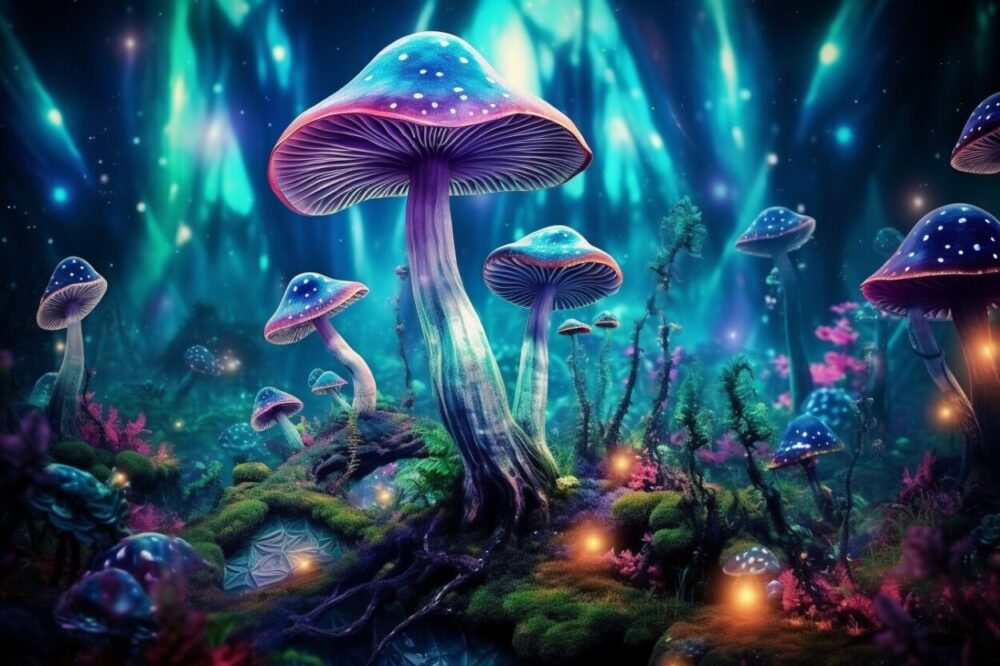
Certain mushroom varieties have bioluminescent properties, emitting light in the dark through a chemical reaction to attract insects which spread their spores. It is a fascinating scene – the fact that a Mushroom can glow brightly in the dark in strange colors is surreal to anyone witnessing. It symbolizes the ability to find positivity in dark times and the magics of nature.
5. Mind-altering experiences
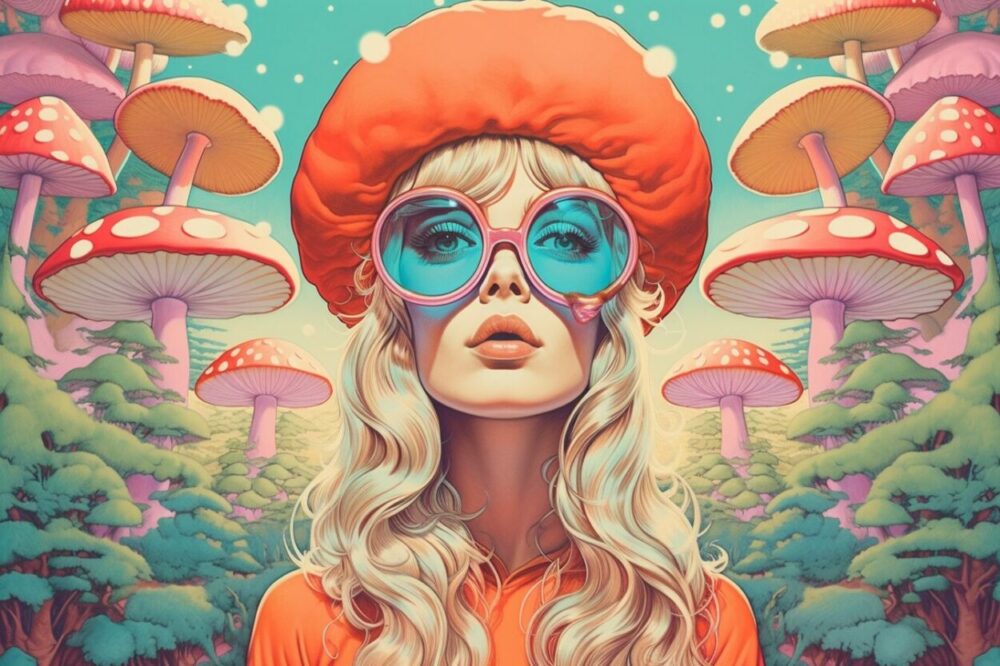
Mushrooms have long been recognized for their healing properties and their spiritual connection. Some mushrooms contain chemicals that induce spiritual and psychedelic experiences, expanding one’s consciousness, leading to great breakthrough in one’s awareness of themselves and the universe. We still have not understood clearly why mushrooms have such powerful reaction in us, but it was surely a gift given to us by nature.
These organisms symbolize the connection to the universe within oneself, and that there is so much to this reality we are inhabiting than we can comprehend, and the spiritual properties of mushroom allow us to glimpse into that abyss.
6. The Phallic Imagery
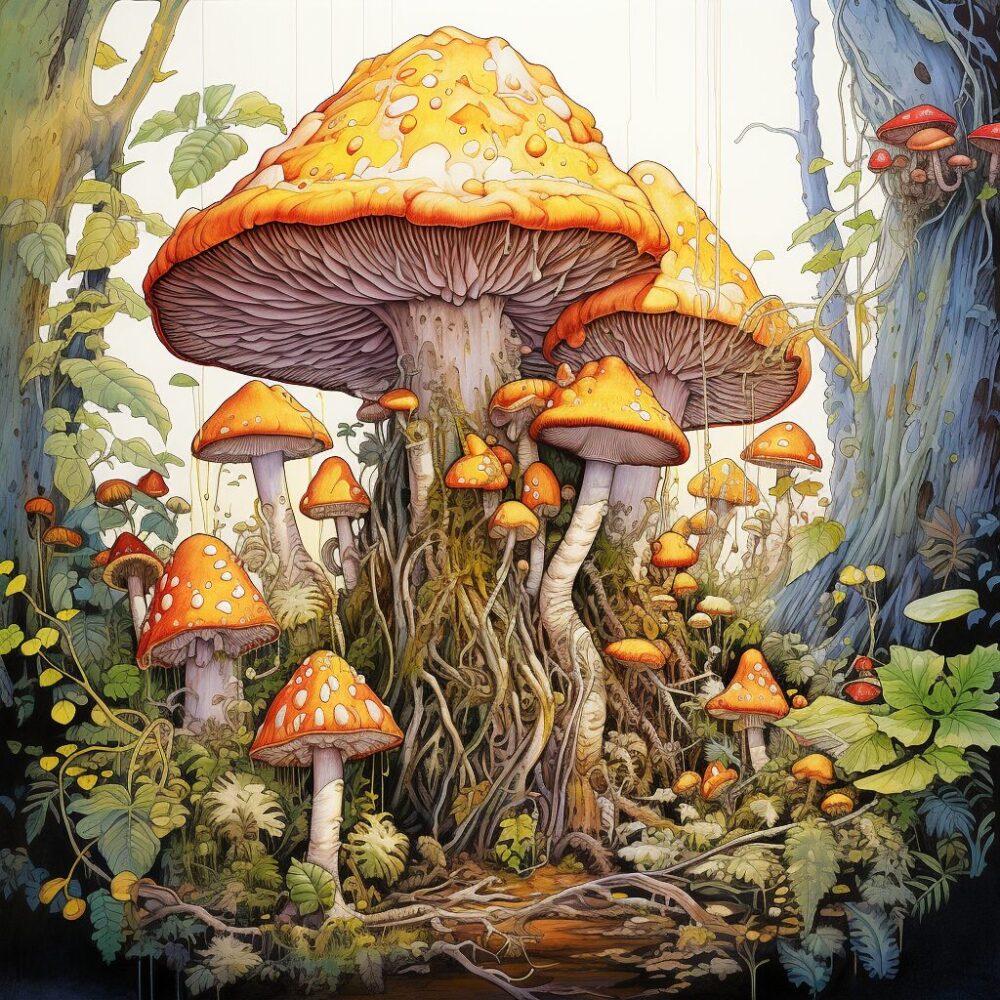
Mushrooms resemble phallic shapes (aka a man’s penis). Of course not all mushrooms are like that, only certain species have a long, cylindrical stem and a rounded cap. This similarity has led to symbolic associations, linking mushrooms to fertility, sexuality, and primal instincts.
Mushroom Symbolism Across Cultures And Community
1. Mushroom symbolism in Native American culture

The ancient cultures of America had an interesting relationship with mushrooms. Shamans, medicine practitioners, and mystics used these substances to enhance their perception, connect with the spiritual realm, achieve harmony with the universe, gain profound insights, and glimpse into the eye of God.
Entheogens, substances with mind-altering properties, are believed to have played a significant role in the development of major religions and the origins of religious practices. Some theories suggest that entheogens like the Hebrew Bible’s “manna” and the Hindu ambrosia known as “soma” were involved. Additionally, there is compelling evidence that Flemish Renaissance painters, renowned for their vivid religious artwork, may have been hallucinating due to fungal infections during the creation of their surreal depictions of otherworldly realms.
2. Mushroom symbolism in Greek
The Greeks were among the first Westerners to explore mushrooms and their origins, with lively cultural exchange between them and their eastern neighbors. Aristotle and other Greek scholars have grappled with understanding mushrooms’ nature and reproduction, classifying them as plants but recognizing their uniqueness.

During the Eleusinian Mysteries in Ancient Greco-Roman culture, a significant religious event, participants consumed a sacred drink known as kykeon. The beverage contained barley and pennyroyal herb. Some scientists suggest that the barley was intentionally contaminated with ergot, a fungus with LSD-like compounds. Others speculate the presence of psilocybin mushrooms or plants with DMT.
Consumption of kykeon was a requirement for participating in the Eleusinian Mysteries, which involved a ten-day journey to the Temple of Demeter, fasting, and culminating with the drinking of kykeon to experience the mysteries of death and rebirth. Through this ritual, participants confronted their fear of death and gained insight into their life’s purpose.
3. Mushroom symbolism in Egyptian mythology

Ancient Egyptians considered mushrooms as exclusive food for the pharaoh and believed in their medicinal properties. They revered mushrooms as divine creations and symbols of immortality. They believed the storm god Set brought mushrooms to Earth through lightning bolts. Only the pharaoh and his companions were allowed to consume mushrooms, while common people were forbidden from even touching them.
The pharaoh Khufu, builder of the Great Pyramid of Giza, particularly enjoyed truffles and ensured they were always available for him. Mushrooms were not only considered delicious but also valued for their health benefits. An Egyptian scholar named Athenaeus included a mushroom recipe in his work, highlighting their medicinal and culinary importance. The Greeks, influenced by Egyptian culture, also embraced mushrooms and shared similar beliefs about their origin and properties.
4. Mushroom symbolism in African cultures
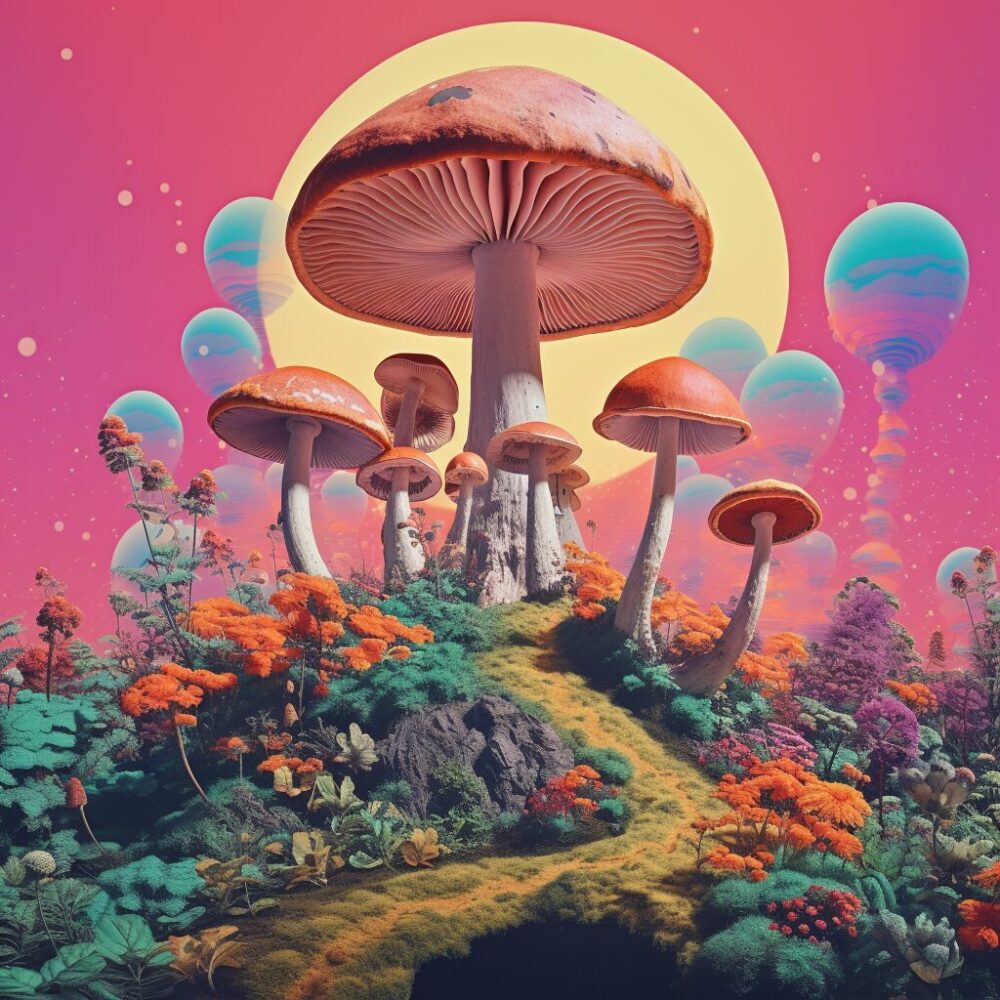
Mushrooms have a long history in Africa, with early records found in the Yoruba tribe of Nigeria. However, due to colonialism, much of the oral history surrounding these mushrooms has been lost. Some cultural knowledge remains with a few elders, but many traditions practiced by smaller tribes and subgroups remain undocumented.
In the Ivory Coast, for example, ethnomycologists have discovered two primary mushrooms: Tamu, known as the “mushroom of knowledge,” and an unnamed mushroom referred to as the “mushroom of action.” These mushrooms are used medicinally by traditional healers to help individuals confront fears and gain spiritual understanding and renewal.
Read More: Snake Symbolism Across Cultures
5. Mushroom symbolism in Japanese and Chinese cultures

Mushrooms have a long history of medicinal use in China and Japan. In Chinese culture, they symbolize longevity and health, while in Japan, they represent purity and new beginnings. Mushrooms are used in traditional medicine and are given as gifts to wish a long and healthy life.
They also play a significant role in culinary traditions, adding flavor to Asian cuisines. Additionally, in Japan, Buddhist priests incorporate the amanita muscaria mushroom into their tea ceremony. With their versatility and cultural significance, mushrooms continue to be treasured for their medicinal and culinary value in East Asian cultures.
6. Mushroom symbolism in Celtic Culture
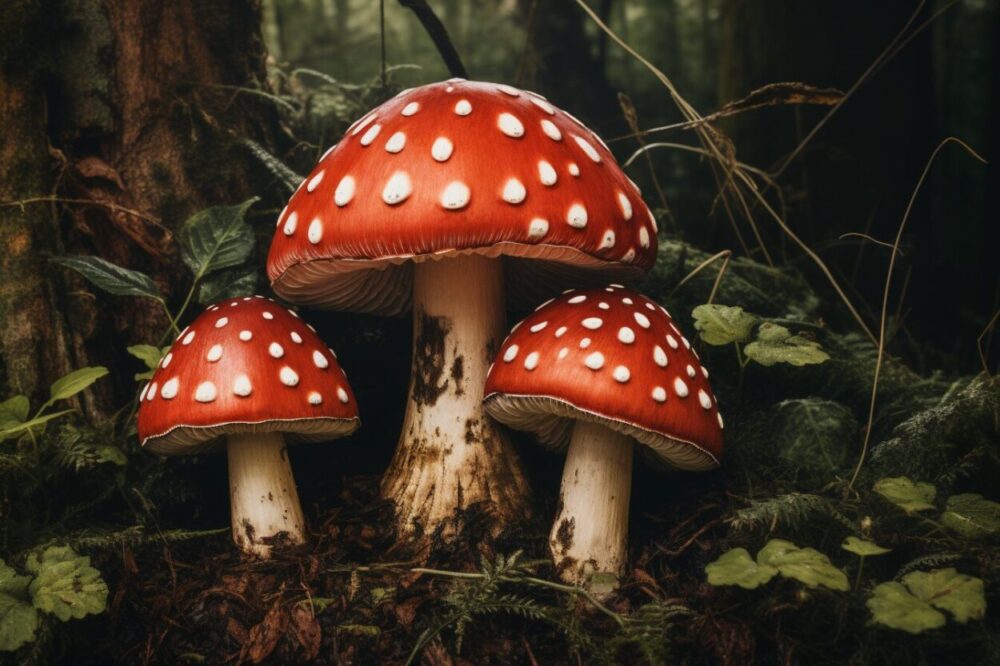
In Celtic culture, mushrooms have spiritual significance, believed to connect the physical and spiritual realms. They were used by Celtic druids to communicate with the dead and were associated with divine beings in ceremonies. Finding a ring inside a mushroom in Scotland was seen as a sign of impending marriage, while in Ireland, mushrooms were believed to be the homes of fairies.
Today, mushrooms continue to hold symbolic meaning in Celtic mythology, representing new beginnings, transformation, rebirth, fertility, wealth, luck, and even possessing magical qualities.
7. Mushroom symbolism in European Folklores
Across cultures, mushrooms have been associated with mythology and magic. Fairy rings, circular formations of mushrooms, have captivated imaginations. In fairy tales, they were believed to be dancing grounds for fairies or gateways to other worlds. Some cultures considered them as tables for fairies or signs of underground fairy villages, while German myths labeled them as “witches’ rings” with enchanting powers.

Austrian folklore attributed their creation to dragons’ fiery tails. The presence of mushrooms in various mythologies and magical beliefs raises intriguing questions. Is it mere coincidence or a deeper connection between mushrooms and enchanting tales?
8. Mushrooms Symbolism In Pop Culture
One of the most famous appearances of mushrooms in popular culture is in Lewis Carroll’s timeless novel, Alice in Wonderland. In the story, Alice consumes a mushroom that grants her the ability to change her size at will, leading to a series of extraordinary and peculiar adventures. The mushroom’s capacity to distort reality and perception has turned it into a symbol of enchantment and metamorphosis in popular culture.

Then we have The Smurfs, a beloved cartoon and comic book series, showcases a community of small, blue creatures who reside in houses shaped like mushrooms. The mushrooms are more than just decorative features in the world of the Smurfs; they are essential to their diet and way of life. Mushrooms are utilized in the creation of potions and other magical substances, and they frequently become the center of the Smurfs’ remarkable adventures.
Dreams Of Picking Mushrooms Meaning
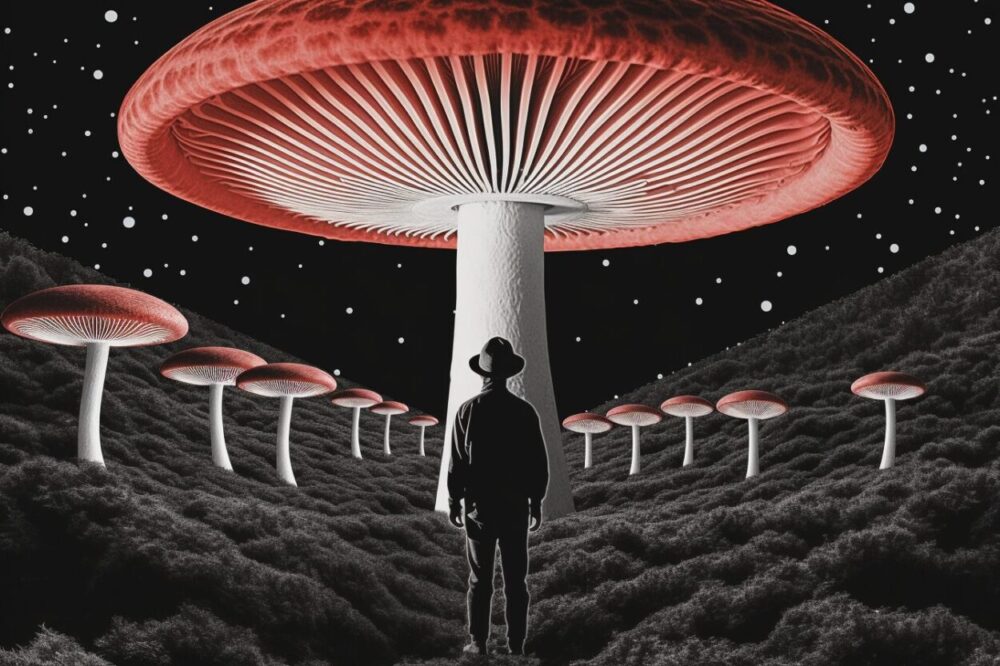
This is a positive dream indicating wealth, prosperity, and a profitable business venture. Success will require knowledge, patience, and courage, despite discouragement from others. Be cautious while entering the market. Picking mushrooms in the dream represents receiving an award for hard work.
However, carelessness and stubbornness may lead to self-made problems that affect your future. Stay cautious, humble, and mindful of interactions with others. If others are seen picking mushrooms in the dream, it signifies jealousy towards their achievements and success in reaching your own goals.
Dreams Of Eating Mushrooms Meaning
This dream has many positive meanings. It suggests that you will overcome challenges and grow as a person. You will learn from mistakes and make better decisions in the future. Eating a mushroom in your dream represents good health, long life, and the chance to learn from others.
However, it can also indicate that someone in your life may deceive you, whether it’s a loved one or a colleague. This deception may involve an important project or inheritance. They think you don’t know about their deceit or that you’re pretending not to care to avoid conflicts.
If you dream of eating a poisonous mushroom, it means you are seeking peace but someone in your social circle is preventing it. It’s important to identify this person before they harm you.
Dreams Of Giant Mushroom Meaning
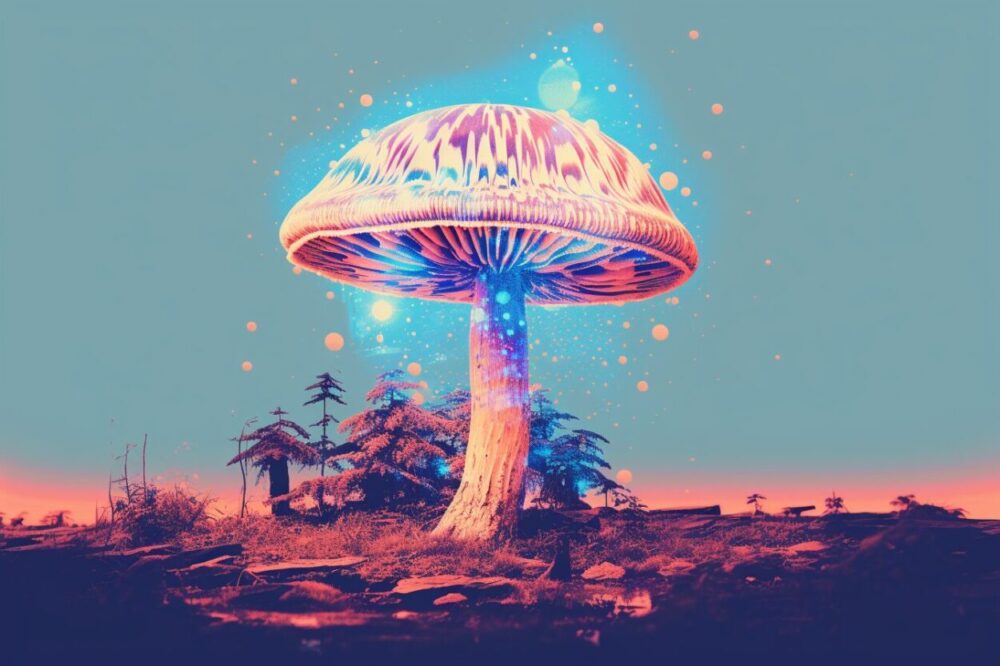
If you dreamed of large mushrooms, it means you’ll have good luck with money. You’ll make smart investments or find valuable things you’ve overlooked. It also suggests that your intelligence and abilities will be recognized, and you’ll receive praise and rewards from people you respect.
If the mushrooms keep getting bigger, it indicates that your career will advance. You can expect more challenging and exciting projects that will help you grow and improve your position. Remember to stay humble throughout this journey.
Conclusion
To sum up, mushroom symbolism is highly important in cultures worldwide. Mushrooms have deep meanings and are found in various contexts across societies. They often represent qualities like growth, nourishment, connection to nature, and the cyclical nature of life. Mushrooms act as a link between the earthly realm and the mysteries of nature.
Furthermore, mushrooms can symbolize transformation and the ability to thrive in unexpected places. They are associated with the hidden wisdom of the natural world and their healing properties. The significance of mushrooms in different cultural traditions, as well as their presence in folklore and contemporary awareness, shows their enduring symbolism and the universal recognition of their profound attributes.
